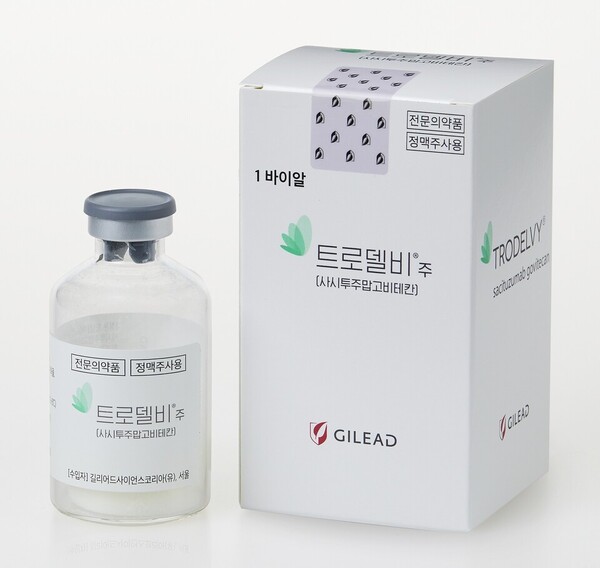Gilead recently launched the first Trop-2-targeted antibody-drug conjugate (ADC), Trodelvy (sacituzumab govitecan), in Korea, providing a new treatment option for patients with metastatic triple-negative breast cancer who have limited options.
Gilead began the domestic supply of Trodelvy on Wednesday.

The drug was previously available through the Korea Orphan & Essential Drug Center but will now be available by prescription from Korean hospitals.
Trodelvy is the first Trop-2-targeted ADC, consisting of a monoclonal antibody that binds to the cell surface antigen Trop-2 and a DNA rotase inhibitor (TOP1 inhibitor payload), SN-38, that destroys cancer cells. By targeting only Trop-2, highly expressed in many types of cancer, including more than 85 percent of breast cancers, the cytotoxic drug is delivered with minimal impact on normal cells.
Trodelvy was approved by the Ministry of Food and Drug Safety (MFDS) in May to treat "adult patients with unresectable locally advanced or metastatic triple-negative breast cancer (mTNBC) who have received two or more prior systemic therapies, at least one of which was for metastatic disease.”
Except for cytotoxic antineoplastic agents, Trodelvy is the only FDA-approved therapy for the second-line or later treatment of patients with metastatic triple-negative breast cancer, regardless of genetic variation or biomarkers, across the entire patient population.
Triple-negative breast cancer is breast cancer that is negative for the estrogen receptor (ER), progesterone receptor (PR), and human epidermal growth factor receptor type 2 (HER2) and is the most aggressive clinical subtype of breast cancer.
It has a high risk of metastasis and recurrence compared to other breast cancer subtypes and a poor prognosis, as it often metastasizes to the brain (30 percent) or lungs (40 percent). The five-year survival rate is only 12% for triple-negative breast cancer, compared to 30 percent for other types.
Triple-negative breast cancer has a high unmet need as treatment options are limited to chemotherapy due to the lack of receptor expression to benefit from hormone therapy or targeted therapies. The prevalence is particularly high in young, working-age women under 40, resulting in a national economic burden beyond the individual disease burden.
Trodelvy demonstrated significant clinical utility in the licensed phase 3 ASCENT study.
In patients with unresectable locally advanced or metastatic triple-negative breast cancer who had received two or more prior systemic therapies, at least one of which was for metastatic disease, Trodelvy reduced the risk of death by 49 percent (11.8 months vs. 6.9 months) and improved progression-free survival by 57 percent (4.8 months vs. 1.7 months) compared to single-agent chemotherapy with Treatment of Physician's Choice (TPC). These benefits were consistent regardless of the presence of brain metastases.
Based on these results, the U.S. National Comprehensive Cancer Network (NCCN) breast cancer practice guidelines classify Trodelvy as Category 1 for the second-line treatment of adult patients with metastatic triple-negative breast cancer.
Related articles
- Limited treatment access hinders progress against triple-negative breast cancer
- Gilead's Trodelvy approved for metastatic triple-negative breast cancer in Korea
- Gliead Sciences Korea seeks reimbursement for Trodelvy
- Metastatic triple-negative breast cancer patients' voices reach Assembly, urging Trodelvy inclusion

